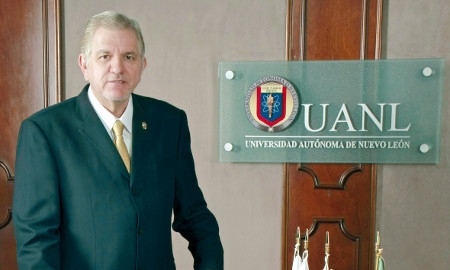For UANL’s Rector, Dr Jesús Ancer Rodríguez, one of the university’s most distinguishing points is its strategic alliance with industry and business.
“We offer students the chance to work, since our goal is for today’s youth to be able to join the job market as quickly as possible,” he says. “
UANL is at the forefront in this regard.”
And it is along this path that Mexico’s higher education institutions are headed, for this type of alliance will help improve the quality of education and benefit not only industry, but also the generation of knowledge.
“It is said that for a country to joint the ‘first world’, it should generate knowledge rather than merely buying it. Mexico is aiming for just that,” says Dr Ancer, adding that the state of Nuevo Leon has led the way in the building of a knowledge city.
“To create the city, we needed the universities and colleges, the government and businesses to join together in the famous so-called triple helix. Nuevo Leon State was a model on a nationwide scale in the creation of infrastructure and the equipment needed for this expert interaction,” he says.
Indeed, late last year Mexico’s President Enrique Peña Nieto visited the technology park and declared that it should be replicated in the rest of the nation’s states.
In Dr Ancer’s opinion, this new approach of linking tertiary education institutions with industry has only served to complement Mexico’s economic stability, resulting in strong and sustained growth.
This year, UANL celebrates its 80th anniversary; however, it can trace its origins back to the year 1857, when the state’s first higher education organisation was formed, comprising colleges of medicine, law, pharmacy and nursing.
Dr Ancer highlights that these roots attest to Monterey’s prescience in strategic planning for higher education.
“These colleges were created to cover the necessities of the time,” he says. “I think it was quite an accomplishment in those days.”
Yet the university’s foresight didn’t end there; in the 1930s, when it was then called the Universidad del Norte (University of the North), it little by little launched new programmes and courses to satisfy industry’s growing need for specialised human resources.
Later, in the 1970s, student and union movements fuelled the institution’s transition to becoming an autonomous university, thus acquiring the name Universidad Autonoma de Nuevo Leon.
Today, UANL boasts impressive statistics. Enrolment has reached 153,000 students, there are 25 UANL graduate divisions on seven main campuses located throughout the state (although the university has a presence in 37 different cities and towns), and it runs 26 faculties, 29 preparatory schools and 37 research centres.
Furthermore, Dr Ancer points out that UANL has more than 500 researchers under its wing who belong to the National System of Researchers, studying along 300 different lines in 142 post-graduate and 33 doctorate degrees, in the fields of health, energy, aeronautics and automotives – areas that can be of great interest to the UK.
“This speaks of a solid platform to create mutually beneficial academic ties,” he says.
UANL already has numerous agreements with several foreign institutions. For example, there is an accord with the French government in which the latter provides technological support to enable French to be the third language on campus. There is also a German scholarship exchange programme in place and UANL has various bilateral exchange agreements with English institutions.
For Dr Ancer, greater relationships with the UK would be in UANL’s interest. “England has many strengths, among which are engineering and health sciences courses. It is important to identify which are the institutions of quality with which we can generate more exchanges,” he says. “It is important to sign agreements but it is even more important to carry them through.”
Aside from its vital links with local industry and the global education scene, UANL also puts its research – as well as its students and staff – to good and practical use at home by helping the state’s less fortunate. Through its community centres, UANL offers free education in conflictive and violent areas, whilst its highly specialised University Hospital attends to patients without social security.
“Other projects we are doing include a school for senior citizens and also a school for the disabled. Equality, coverage and training are the most important issues for the university. My goal for the next three years is to consolidate this project, take it to an international level and ensure people know about the strength of a public institution like UANL,” says Dr Ancer.
“Being an agent of change is in our roots and that is part of this project. Our priorities are to manage social responsibility, provide quality education and internationalise the university. On top of all this we are the only university that has a Liaison and Economic Development Secretary, as we are a public institution and one of our main challenges is to obtain resources.”
A keen proponent of effective corporate social responsibility (CSR), among the actions undertaken by the university in order to meet the needs of the environment in a responsible, timely and effective way, UANL has increased the number of projects and agencies that conduct research, development and use of technologies related to environmental sustainability.
UANL is also dedicated to fostering creativity in the arts, humanities and social sciences. Its Radio Universidad station and UNAL TV channel, called The Knowledge Channel, enable students to hone their broadcasting skills on a national level. It also has an online art gallery – “Space of Art” – which is the digital version of the monthly exhibitions it holds at its main Administration Building.

0 COMMENTS